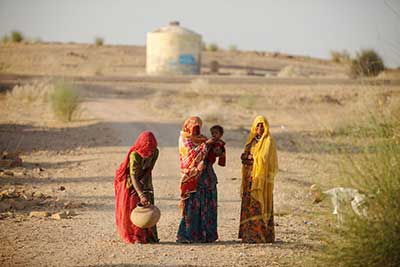Relevance: GS-3: Climate Change and International Conventions.
18/11/2022
Key Phrases: Water Credit, Climate Change, Climate Adaptation, COP(Conference of Parties), UNFCCC, Developed Countries, Mitigation Efforts, Global Warming, Climate Adaptation Cost, Credibility, UNEP, Climate Challenge, GHGs Footprint, Corporate Social Responsibility, Companies Act 2013, Carbon Neutrality, Net Zero Emission.
Context:
- During the discussion at COP 27 of UNFCCC (which is being held in Sharm el-Sheikh, Egypt), climate finance was a critical issue discussed comprehensively.
Key Highlights:
- According to the World Bank, India bears losses worth $9.8 billion each
year as a result of extreme events, with floods alone accounting for 50 per
cent of the damages.
- In 2020, floods led to damages equivalent to 0.15 percent of the country’s GDP in addition to thousands of lives being lost or impacted.
Issues of Finance for Climate Adaptation:
- Lack of Support
- International support for climate adaptation is skewed towards mitigation projects.
- The modalities of financing mechanisms have seen a shift from grants to loans.
- Local Nature of CSR Initiatives.
- Often actions under CSR are directed by context-based targets that
represent the most critical challenges of the environment where
businesses are embedded.
- Therefore, the nature of the initiatives mostly remains local.
- Often actions under CSR are directed by context-based targets that
represent the most critical challenges of the environment where
businesses are embedded.
27th Conference of Parties (COP27)
- The 2022 United Nations Climate Change Conference, also known as COP27, is the 27th United Nations Climate Change conference.
- It is being held in Sharm el-Sheikh, Egypt from November 6 to November 18, 2022.
- COP27 will bring governments together to accelerate global efforts to confront the climate crisis.
- It is an important meeting because the latest science shows that climate change is moving much faster than we are, pushing ecosystems and communities to their limits.
- The Conference of Parties comes under the United Nations Climate Change Framework Convention (UNFCCC) which was formed in 1994.
- The UNFCCC was established to work towards the “stabilisation of greenhouse gas concentrations in the atmosphere.”
Water Credit: Collective Effort to Climate Fund:
- The benefits of such a collective approach are considerable.
- By securing the resource base, everyone benefits.
- From the industries’ point of view, they could reduce risks to their own water supply in the present and the future, and also achieve higher ESG ratings.
- The adoption of water credits would require a multiplayer approach.
- Its implementation would need a systemic-level intervention to include regulatory players and local governance institutions for water resources as well as sustainability advocacy groups and industry leaders.
Water Credit
- Water credits are one of the financing mechanisms to drive collective action toward common climate adaptation goals.
- Water credits represent a fixed quantum of water that is conserved or generated and can be transacted between water deficit and water surplus entities within a sub-basin.
- The concept of water credits is similar to carbon credits; however,
unlike the atmosphere, the spatial limit for the transaction should
remain within the same hydrological unit — that is, a river basin or
watershed.
- For example, multiple industries can offset their impact by buying water credits from municipalities that are fund-crunched to finance large-scale floodwater harvesting or wastewater treatment projects that conserve freshwater resources at a city level and promote wastewater reuse.
Way Forward:
- It is necessary to find alternative means of leveraging local financing opportunities to build resilience.
- From the private sector, CSR allocations can be reimagined as adaptation finance.
- Channeling CSR funds more effectively towards climate adaptation may
provide a new source of climate finance.
- CSR funds potentially represent the third largest pool of climate finance after government spending and multilateral financing.
- There is a potential to address climate adaptation but it will require
industries to pool finances.
- The industrial sector is the second highest user of freshwater in the country.
- For developing countries to enhance their ambition, developed countries must provide enhanced support.
- Need for nature-based solutions to link actions on mitigation and adaptation in terms of planning, financing, and implementation, which would provide co-benefits.
- It is required urgent efforts to increase the financing and implementation of actions designed to adapt to the growing impacts of climate change,
- There should be collective effort around making adaptation projects investible.
Conclusion:
- We need to fundamentally re-evaluate our priorities towards climate change by striking a better balance between mitigation and adaptation efforts.
Source: The Hindu BL
Mains Question:
Q.What are the issues related to climate finance? How can water credit fund climate needs? Critically analyse. (150 Words)








